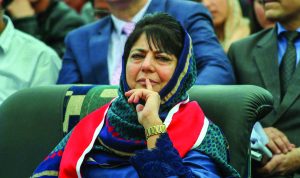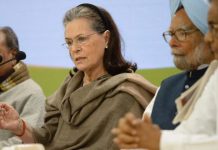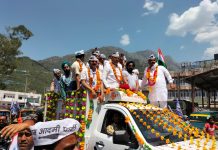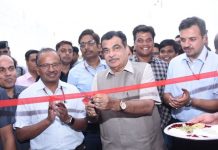 On January 6, senior PDP leader Javed Mustafa Mir quit the party, sixth major leader including the former finance minister Haseeb Drabu, to do so ever since the Governor Satya Pal Malik dissolved the Assembly on. Three of these leaders have joined Sajad Gani Lone led People’s Conference and one National Conference while Mir is yet to decide his future course of action.
On January 6, senior PDP leader Javed Mustafa Mir quit the party, sixth major leader including the former finance minister Haseeb Drabu, to do so ever since the Governor Satya Pal Malik dissolved the Assembly on. Three of these leaders have joined Sajad Gani Lone led People’s Conference and one National Conference while Mir is yet to decide his future course of action.
These successive exits have left the PDP, once a vaunted political force, reeling and its leader Mehbooba Mufti struggling to hold her flock together. The situation for her has become more unenviable considering the state is heading into a possibly simultaneous Parliament and Assembly polls in May. And the party is unlikely to find winning replacements for the exited candidates. More so, when the leaders who have left command a significant support base in their respective constituencies.
Though the PDP still has several strong leaders, the prevailing unpopularity of the party is going to make it an uphill task for them to retain their seats. There is every chance that the some more of them might be on their way out.
This reduces the PDP to a small group of leaders comprising Mehbooba and the loyalists including her family members, some of them with little to no constituency. This has raised a question mark over the future of the PDP as a political force in the state. The situation looks grimmer for the PDP as unlike the rival National Conference, it is not a cadre based party.
The PDP was founded by the late Mufti Mohammed Syed, Mehbooba’s father, in 1999 amid growing public disaffection with the then ruling National Conference. It won 16 seats in 2002 Assembly elections enabling it to form the government in alliance with the Congress. The party was in power for six years through a rotational arrangement with the alliance partner, with the parties sharing the chief ministership for three years each.
The 2008 elections saw the party advancing its tally from 16 to 21 seats, thereby cementing its standing as an established political party. However, it’s probable second shy at power fell through after the Congress switched loyalty to NC.
In 2014, the PDP came back even more stronger, emerging as the largest single party with 28 seats. But this time, the party formed the government with the ideologically anti-thetical BJP, as the latter turned out to be the second largest party with 25 seats. The BJP had largely swept the Hindu majority Jammu region, making it an unavoidable partner in the new ruling coalition for the state.
Though the coalition was formed with the best of intentions, with the parties taking time to forge the Agenda of Alliance which worked out their political differences and outlined a plan for development, it didn’t go well from the word go. In the first 100 days while the political and ideological confrontation hurtled to the centre stage, almost hobbling the government, the governance too didn’t get much forrader. Also, while the BJP aggressively propagated its ideological stance on the state, even initiating direct and indirect steps to execute it on the ground, the PDP didn’t appear to stand up to its partner.
But the biggest damage to the PDP’s credibility was done by the extended 2016 unrest which broke out following the killing of the popular commander Burhan Wani. Around 100 people were killed, a significant number of them teenagers and more than a thousand were hit by pellets in their eyes, blinding many of them partially or completely. Throughout the duration, then Chief Minister Mehbooba — albeit, initially shaken and distraught — appeared increasingly apathetic towards killings, at times, making insensitive comments like that the protesting youth who were killed or blinded by the security forces “weren’t asking for toffees from them”.
This severely affected her personal political standing in the state, even as the alliance with the BJP continued to take its toll on her party. Whenever, a Muslim was lynched in any part of the country, the PDP attracted some blame too. Similarly, Mehbooba found her position untenable as the BJP spoke against the J&K’s special position in the Constitution and pledged itself to revoking it. More so, when the. BJP allied NGOs filed petitions against Article 370 and Article 35A in the Supreme court.
By the time, the BJP unilaterally withdrew its support to the PDP in June last, Mehbooba had not only exhausted all her political capital but turned herself into a hate-figure. This was why, far from triggering any protests, Mehbooba’s loss of power was widely celebrated.
It was apparent from the posts on social media. The posts and memes reflected a long pent-up frustration with the PDP, especially with Mehbooba.
Loss of power has only made things worse for her. Sensing bleak chances of being re-elected in the upcoming polls and with no strong ideological glue to hold them together, the leaders are abandoning the PDP and joining the NC or the People’s Conference. This has raised existential questions for the PDP.
Mehbooba has tried to fight off the increasing irrelevance by resorting to her familiar soft separatist politics. Over the past two weeks she has visited the families of two militants and called on the Governor Satya Pal Malik to restrain the security forces from harassing them.
“I request Governor Satya Pal Malik to issue clear directions to stop such harassment (of families of militants),” said Mehbooba. She has also apologiszed for the “toffee remark,” saying she had made it out of concern for the dying youth at the time.
“I was angry that the youth throwing stones and getting killed were the same who used to attend my rallies,” Mehbooba said at a recent rally in South Kashmir. “But, if it has hurt people, I apologize for it”.
She has also sought to put accent on the demand for resolution of Kashmir. She now frequently pitches for Indo-Pak dialogue, highlights human rights violations and criticizes the BJP, her old trademark planks to mobilize public support. But all of this looks unlikely to salvage her standing in the near term. Or at least, not until the upcoming elections.
“PDP is certainly at cross-roads. Mehbooba more so. Her three year term in the government is likely to haunt her for a while now,” says Naseer Ahmad, a local columnist. “Mehbooba’s relevance lies in how she reinvents her core politics and makes it consistent and credible”.
letters@tehelka.com











